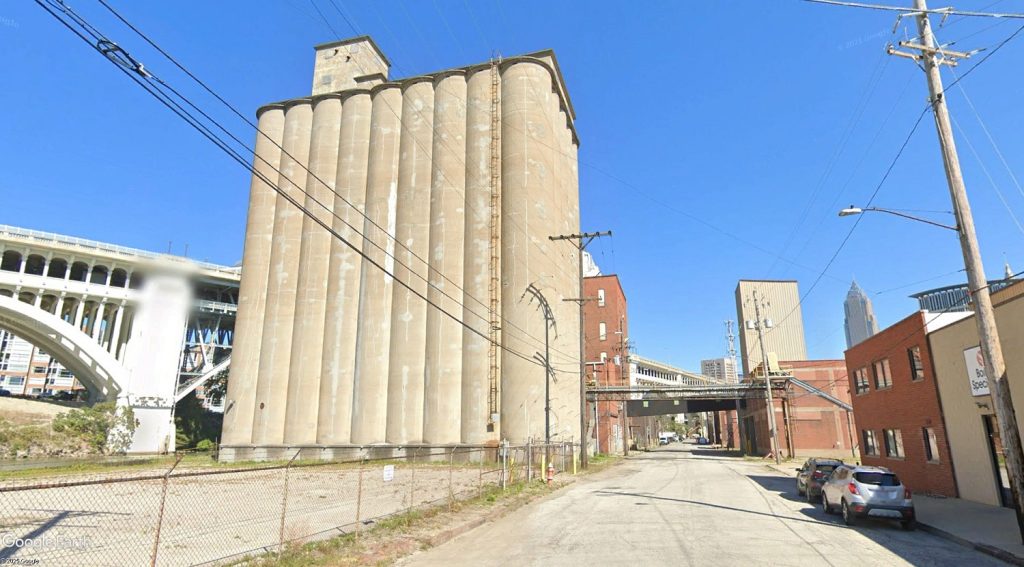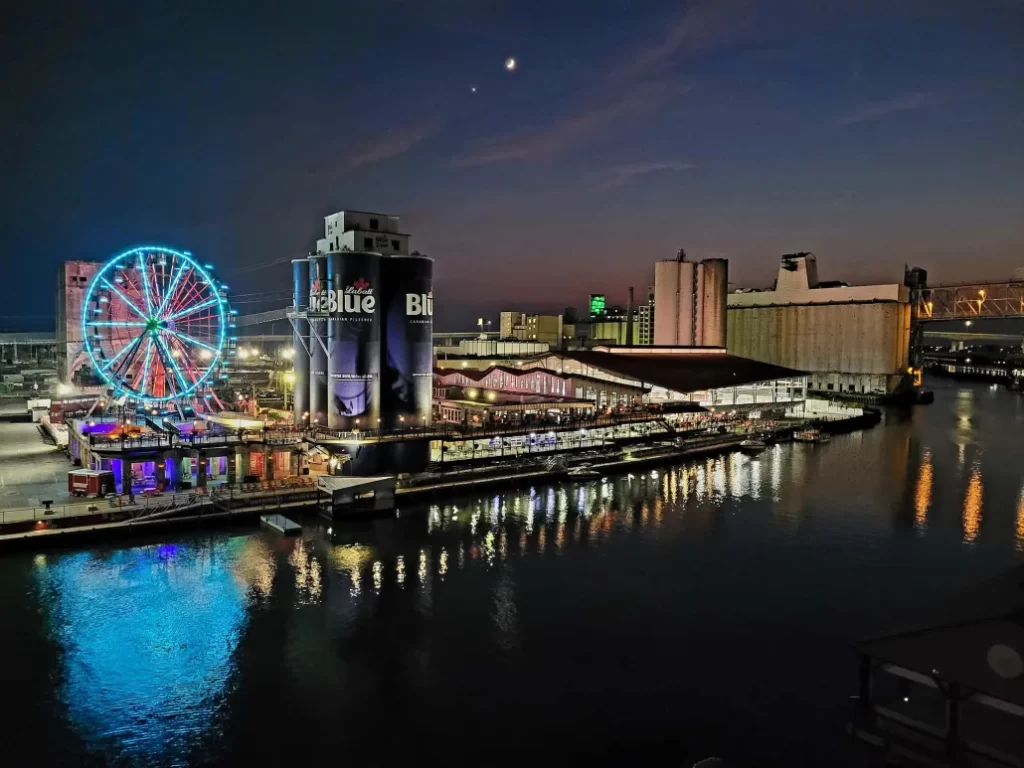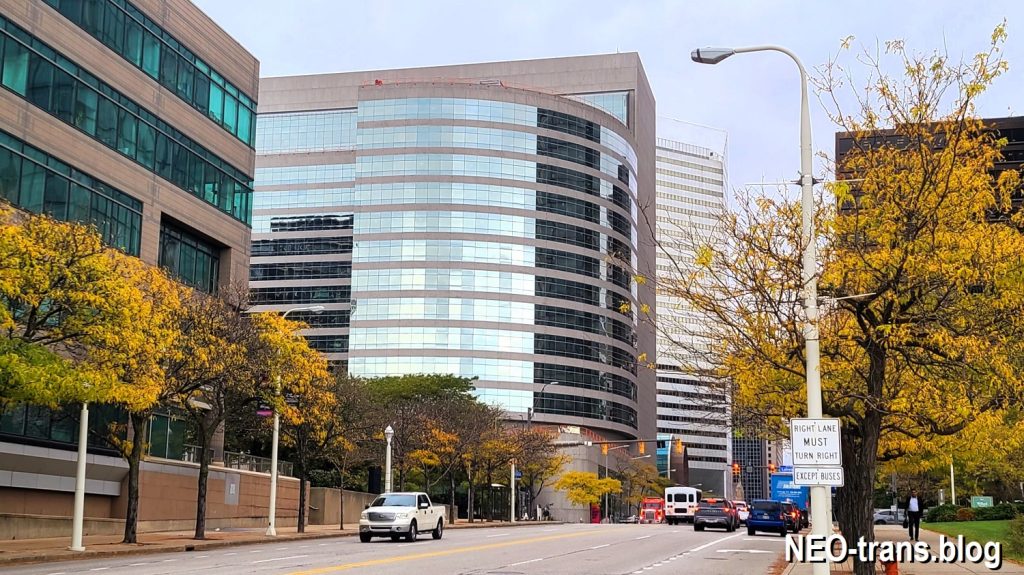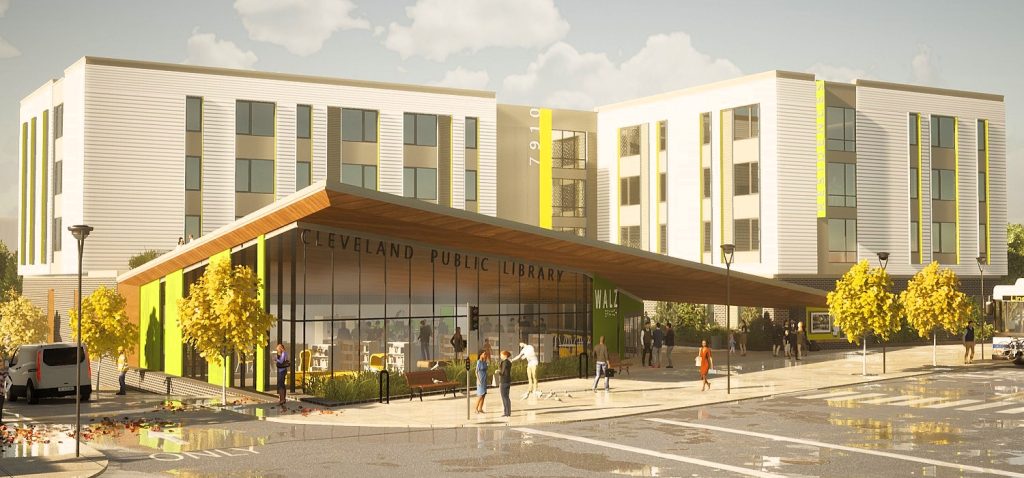Grain Craft to be razed for riverfront access

Since the 1930s, the massive Grain Craft silos have been a familiar sight along the Cuyahoga River, on the Flats’ Columbus Road peninsula. But they may not be around much longer if a planned application for demolition and clean-up funds by the Cleveland Metroparks is successful.
The Metroparks’ board is expected to vote tomorrow to authorize staff to pursue a $2,215,335 Ohio Brownfields Program grant leveraged by Metroparks’ matching funds. The matching funds of $1,804,492 include some Metroparks’ costs that have already been incurred, such as fee title acquisition costs and for environmental site assessments related to the acquisition of the Grain Craft property.
In December 2023, the Metroparks spent $3.5 million to acquire 3.3 acres of land and a flour mill operated by Grain Craft and owned by Cereal Food Processors Inc. NEOtrans broke the story in 2020 that the flour mill would close that summer due to a pending loss of rail service by the Flats Industrial Railroad.
The Metroparks acquired the flour mill property to increase public access to the riverfront. The focus of that acquisition was a 1.22-acre parcel on the riverside of Merwin Avenue and having an address range of 1636-1656 Merwin.
Another 2 acres of the mill property acquired by the Metroparks more than a year ago is on the other side of Merwin and not next to the river. It hosts historic brick buildings from the 1800s in various conditions. It apparently is not the subject of any pending demolition request.
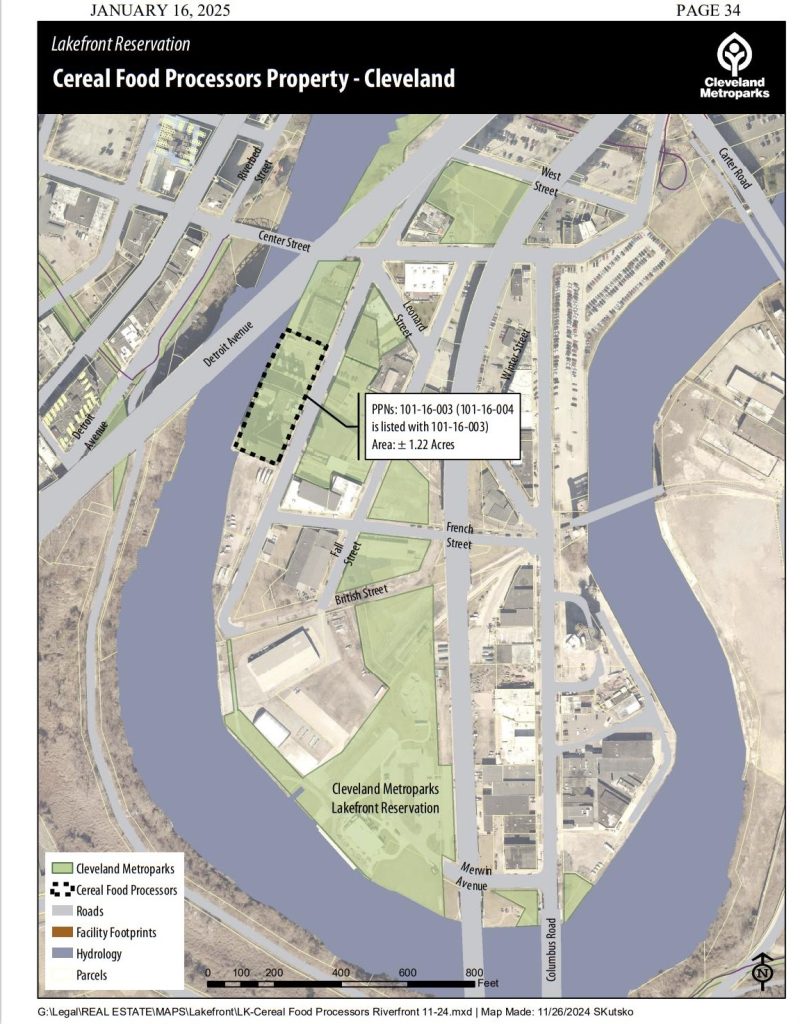
Properties shown in light green belong to the Cleveland Metroparks. The area inside the dashed line is the portion of the land recently owned by Cereal Food Processors for the Grain Craft mill is the subject of a pending funding request to demolish structures and clean up the site (Metroparks).
The riverside property that is the subject of the pending demolition and clean-up funding contains a 6,030-square-foot mill building from the 19th century, a 1,075-square-foot storage shed, and a series of 22 grain silos. The five-by-nine silos, built in 1937, are massive. They stand about 155 feet tall, equal to a 14- to 15-story-tall building.
Ohio Brownfields Program funding is administered by the Ohio Department of Development. The Cuyahoga County Land Bank is Cuyahoga County’s designated agency to receive and prioritize applications from local entities for subsequent submittal to the Ohio Department of Development.
Cleveland Metroparks has applied to the Cuyahoga County Landbank for funds to remediate portions of the Grain Craft Property that have been impacted by past grain mill operations, according to public records provided by the Metroparks.
Demolition of the affected Grain Craft structures is the proposed outcome based on the title of the action item on tomorrow’s Metroparks board meeting agenda. It reads “Ohio Department of Development Brownfield Remediation Program – Demolition and remediation of the Grain Craft property – Authorization to submit grant application and commit funds.”
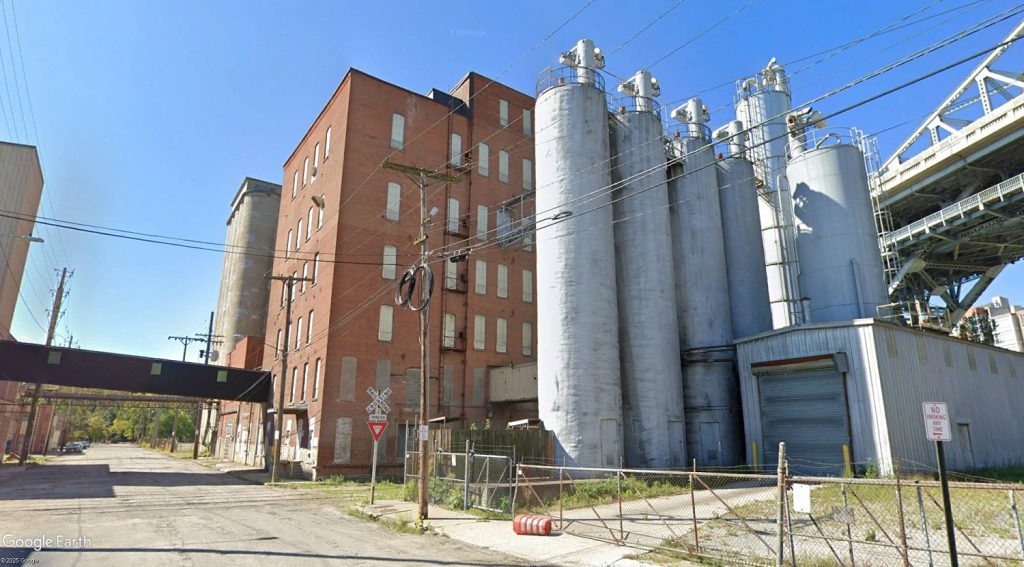
Looking in the opposite direction on Merwin Avenue from the first photo, the former Grain Craft mill that closed in 2020 could be demolished. But a preservation consultant suggested it could be redeveloped by the Cleveland Metroparks for public uses including waterfront entertainment, a hotel, active sports and others (Google).
“A portion of the Grain Craft property will be remediated in accordance with the (Brownfields) program,” a Metroparks summary of the funding request reads. “Funds are also requested through the program for administrative fees to ensure Voluntary Action Plan compliance, a Covenant Not to Sue, and to file a No Further Action notice, all of which are requirements of the program.”
Although the flour mill isn’t listed on the National Register of Historic Places, it was submitted for registration in 2013 but not followed up on. The grain mill was the last one left operating on the Cuyahoga River when it closed and today is the last one still standing.
In that application, it noted that the mill is located on a site with remnants of an 1856 buhrstone mill. A rounded buhrstone has “teeth” carved into it to aid in crushing grains into fine powder. The oldest existing structure slated to be razed, a seven-story brick building, dates to 1882 according to the filing.
“Yes, I’d say the properties are National Register-eligible and that more planning is needed to determine their fate,” said historic preservation consultant Steven McQuillin. “Metroparks should consider preserving these buildings.”
While the mill wasn’t listed on the National Register of Historic Places, the entire Columbus Road Peninsula is. It was originally envisioned more than 200 years ago as a mixed residential and mercantile development called Cleveland Centre. The mill may be considered as architecturally contributing to the historic district. Any demolitions here would have to get the blessing of the Cleveland Landmarks Commission.
McQuillin said a redevelopment like RiverWorks in Buffalo, NY, set amid large grain silos like Grain Craft’s, could be a good model for the Metroparks. RiverWorks is located along the Buffalo River and offers a waterfront complex for skating, hockey, curling, concerts, dining, bars and concessions. He also noted Akron’s Quaker Square which repurposed downtown grain silos into a hotel and later for use as student housing for the University of Akron.
In recent years, the Metroparks has increasingly acquired more land on Cleveland’s Columbus Road peninsula to expand is Lakefront Reservation and increase access to the city’s waterfronts. The peninsula today is the site of growing real estate investment and redevelopment activity centered around active sports including indoor and river rowing as well as a skate park.
Two emails were each sent to the Metroparks Chief Development Officer Natalie Ronayne and to Chief Planning and Design Officer Sean McDermott, seeking comment for this article. Neither responded prior to its publication.
END

